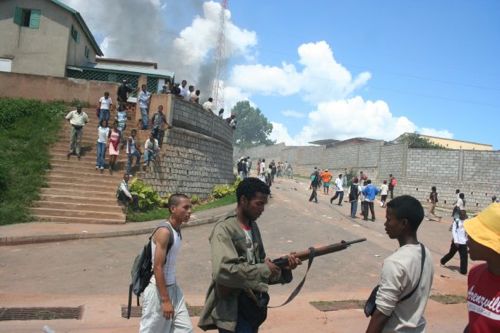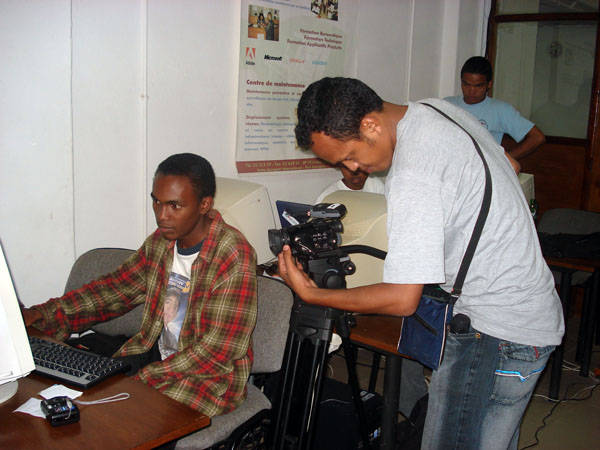2009 is coming to an end. It was (and still is) a tumultuous year for Madagascar. The following article is the first half (January to April) of a two-part summary of the events that marked 2009, from the perspective of citizens who lived through the turmoil.
January:
As people started to protests in the streets of Antananarivo, many citizens were aware early on that the upcoming political crisis was taking an unusual turn because many prisoners ran freely from prisons all around the countries:
Jentilisa wondered aloud about the cause of such unusual events (mg):
Heverina ho misy ny atidoha nikotrika ny raharaha ary olona ivelan'ny voafonja ny atidoha, satria tsy tokony hanana finday na fitaovan-tserasera hafa ireo voafonja ireo handosirana tao
anatin'ny indray alina. Tarataratra ho fitadiavana hanakorontanana ny firenena amin'ny alalan'ny tsy filaminana no tanjona na fanindriana ankolaka ny olona tsy hihetsika satria hanampy isa ireo olona natao hanakorontana fotsiny (A qui profite le crime?). Hisy raharaha ity volana Janoary sy ny tohiny ity izany koa!
(En): One has to suspect that there had to be a mastermind behind this affair, a mastermind from outside, because the inmates could not possibly get all those “tools” in one night. Is this all about trying to disturb the public order or is it to prevent people from making a move because they will be accused of disturbing the public order ( who benefits most from the crime?). It sure will be quite an interesting month of January !
Unfortunately, January turned out to be a deadly month as twitterers in Madagascar recalls Black Monday, the day when security forces vanished and various arson and looting took place in the capital city resulting in dozens of casualties. A forumist asks: (mg):
“Ny fanontaniana mipetraka sy tonga ho azy dia ny hoe inona moa no mahasamihafa ny zavatra potika amin'izao taona 2008 izao amin'izay zavatra potika tamin'ny taona 2002? … Ka inona ary no vaha-olana tsy hiverenan'ny fanapotehana intsony?”
The question we are now naturally asking is the difference between the current destruction and
the destruction of things in 2002?… What is the solution so that looting and destruction like these never happen again?
the destruction of things in 2002?… What is the solution so that looting and destruction like these never happen again?

February:
February 7th, deemed “Red Saturday”, claimed the lives of at least 80 protesters, among them Ando Ratovonirina, a 26 year old cameraman for the television station RTA.

Barijoana, one of the very first Malagasy blogger, was a witness to the scene and wrote (fr):
“J'étais persuadé que tout avait été négocié à l'avance, que la foule resterait gentiment à distance,
que seule une petite délégation entrerait à l'intérieur des grilles du palais et que c'est cette
délégation qui demanderait ensuite à la foule de se disperser.
J'étais trop loin pour savoir ce qui s'est passé dans la foule peu avant que le cordon de sécurité ne lâche. Si un responsable du mouvement a laissé entendre qu'on pouvait “y aller”, sa responsabilité est énorme.
Je ne peux parler que de ce que j'ai vu et entendu de mes propres yeux, mais ai trouvé étonnant que Andry Rajoelina et Monja Roindefo soient restés à l'écart des délégations négociant l'entrée dans les grilles du palais.”
(En) “I was convinced that all had been negotiated in advance, that the crowd would remain at a polite distance, that only a small delegation would enter inside the gates of the palace, and that this delegation would then ask the crowd to disperse. I was too far away to see what happened in the crowd before the security barrier was gave way. If one of the mass protest managers had led the crowd to believe that they could go in, his responsibility is enormous. I can only talk about what I have seen and heard, but I have found it astonishing that both Andry Rajoelina and Monja Roindefo have stayed away from delegations negotiating their entry past the gates of the palace.”
It is to be noted that the HAT (transitional government) promised a thorough investigation of the events that caused many deaths on January 26th and February 7th and until now, no official reports or conclusions have been made public, adding confusion to the contradicting testimonies from different sides.
March:
The crisis deepens as public protests dwindled down, now replaced by division in the armed forces. Ariniana posted on her twitter feed:
"I feel like in a war movie. I can't believe it's real. I am damn terrified."
Tahina illustrated vividly the climate of fear and mistrust that overcame everyone:
It’s no longer safe to talk politics in public areas (buses included) because you don’t know who’s listening to you and on which side they are. A simple rumour about you can harm you or your relatives.
On March 17th , Andry Rajoelina, former mayor of Antananarivo and current president of the transition, seizes power after a handover from the army. Understandably, opinions were divided on the coup d’etat and its future outcome. Madagate was satisfied by the outcome that put Ravaloamana out of power (fr):
Marc Ravalomanana, le petit laitier d’Imerikasinina, a été renié par ceux à qui il venait de remettre les pleins pouvoirs. Ils n’ont pas voulu vendre leur âme au diable. Les carottes sont cuites pour ce président qui a montré son véritable visage. A force de jouer avec le feu et les idoles, on se brûle. Ce fut vraiment le combat de la lumière et des ténèbres.
(En) Marc Ravalomanana, the little milkman from Imerikasinina, was rejected by the very ones he gave power to. They did not want to sell their soul to the devil. The deed is done for this president who showed his real face. When you play with fire and idols, you get burnt. It was truly the victory of light over darkness.
Hery believed (rather accurately) that peace would not settle soon in Madagascar despite the change (mg):Tsy resy lahatra aho amin'ny hilaminan'ny politika ao Madagasikara ao anatin'ny 2 taona farafahakeliny raha mandray fitondrana ny TGV [..] Hafa ny mitolona, ary hafa ny mitondra firenena.
Politics will not stop erupting in Madagascar for the next 2 years if Rajoelina takes power [..] Fighting [those in] power is different from governing the country.
April:
A video of a lone protester named Razily marching towards armed forces hurling tear gas becomes an internet sensation in Madagascar and is seen by many as the symbol of the fight against military repression:
The second part of this review article will highlight bloggers' posts from May to December 2009 and it will be posted shortly. In the meantime, please read Tahina's compelling testimony of the toll that the crisis took on the life of one of his relative. Here is an excerpt:
For two or three months, I had to find money to make ends meet. It was hard as hell. The saying “You look for today what you’ll eat today” started to had a full sense to me. I was living it. I went to a uncle of mine to borrow some money and promised him I’d give it back as soon as possible. And I really wanted to keep my words but two months later, my wife was robbed in a bus with a-month-worth salary in her bag. I was hopeless, the little that I thought would help us was taken away from us.

No comments:
Post a Comment